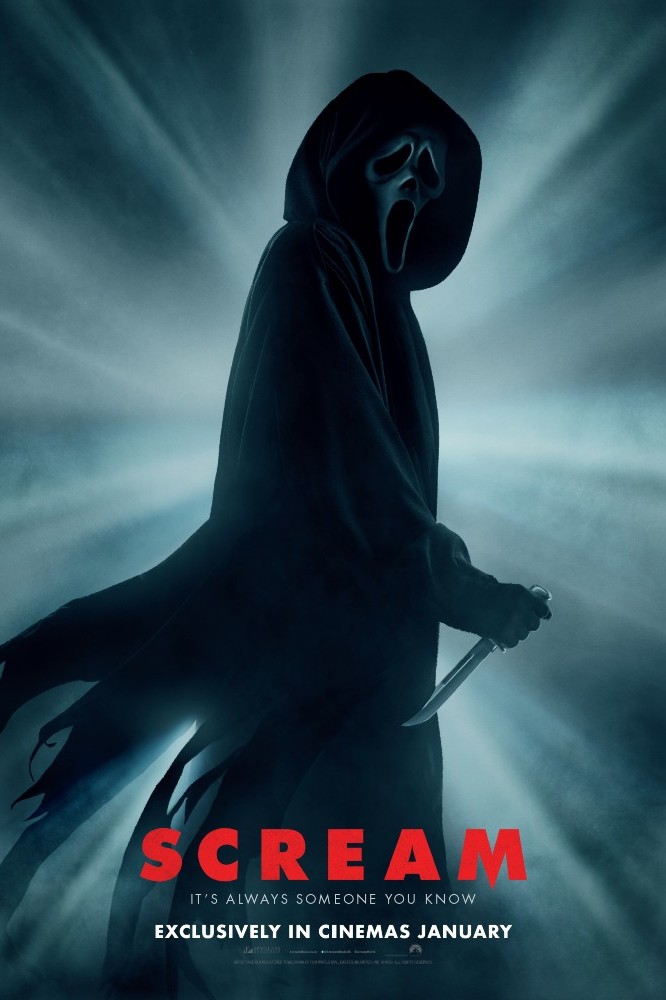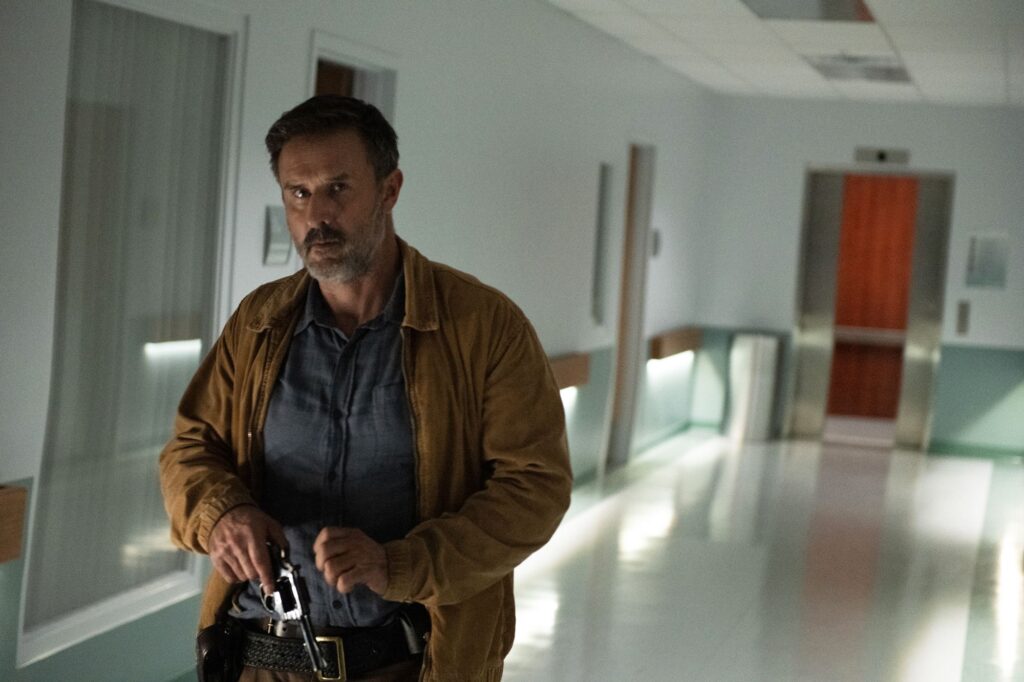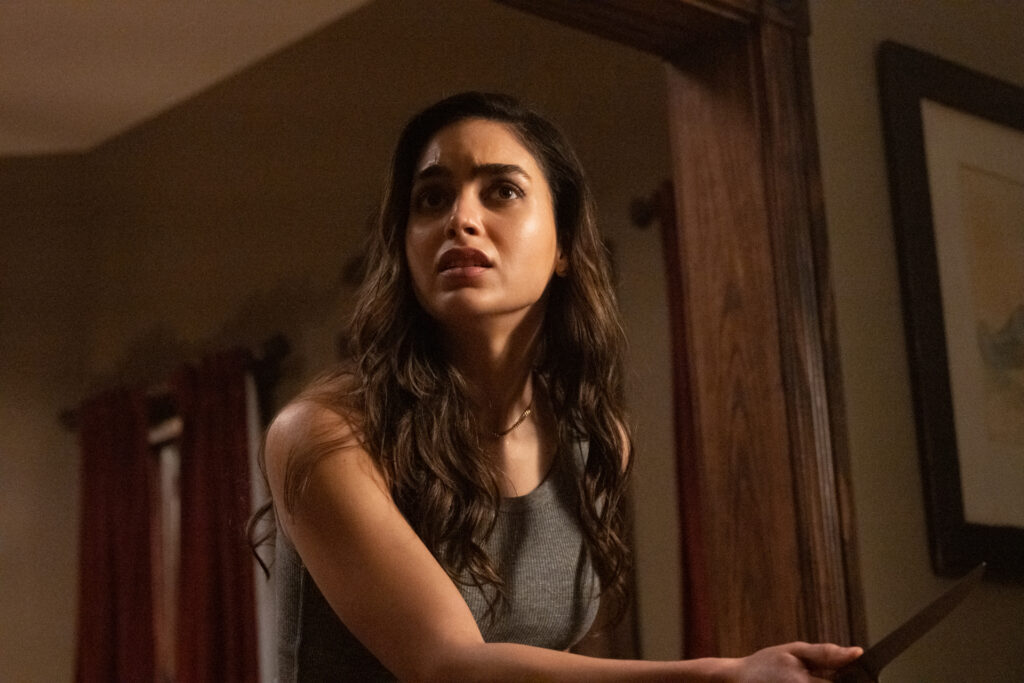Want to hear more from the actors and creators of your favorite shows and films? Subscribe to The Cinema Spot on YouTube for all of our upcoming interviews!
Managing editor & film and television critic with a Bachelor's of Arts in English Literature with a Writing Minor from the University of Guam. Currently in graduate school completing a Master's in English Literature.
The film — and perhaps, by extension, the television — buff community needs to give up. On what, you may ask? The idea that projects releasing in January are bound to be terrible. This month of this year, we have Hulu’s How I Met Your Father as well as Matt Bettinelli-Olpin and Tyler Gillett’s Scream.
Let me focus this little thesis on the latter. Scream (2022) is written by James Vanderbilt (Darkness Falls, Zodiac, The Amazing Spider-Man) and Guy Busick (Final Destination 6).
There will be no spoilers here, as the title of this article suggests. Although, I will discuss major elements and themes present in the film. This means that I may call upon very minor spoiler details. Nonetheless, please read ahead at your own discretion to avoid any possible revelations.

Plot Summary
Here is the official synopsis for Bettinelli-Olpin and Gillett’s Scream.
Twenty-five years after a streak of brutal murders shocked the quiet town of Woodsboro, a new killer has donned the Ghostface mask and begins targeting a group of teenagers to resurrect secrets from the town’s deadly past.
via Bloody Disgusting
The Cast of Scream
As unusual, Neve Campbell, David Arquette, and Courteney Cox return as Wes Craven’s respective legacy characters: Sidney Prescott, Dewey Riley, and Gale Weathers.
As always, Roger L. Jackson returns as the voice of Ghostface. Small appearances from previous Scream franchise cast members include Skeet Ulrich as Billy Loomis, Heather Matarazzo as Martha Meeks, and Marley Shelton as Sheriff Judy Hicks.
Thanks to casting director Rich Delia and some others, making the new roster of possible victims (and culprits) is a new group of young individuals.
- Melissa Barrera (In the Heights) and Jenna Ortega (The Babysitter: Killer Queen) star as sisters Samantha “Sam” and Tara Carpenter, respectively;
- Jack Quaid (The Boys) plays Richie Kirsch;
- Mason Gooding (Booksmart) and Jasmin Savoy Brown (Spider-Man: Miles Morales, Sound of Violence, Yellowjackets) portray twins Chad Meeks-Martin and Mindy Meeks-Martin, respectively;
- Dylan Minnette (Let Me In, Prisoners, Goosebumps, Don’t Breathe) portrays Wes Hicks, the son of Shelton’s character;
- Mikey Madison (Once Upon a Time… in Hollywood) portrays Amber Freeman;
- Sonia Ben Ammar appears as Liv McKenzie; and
- Kyle Gallner (A Nightmare on Elm Street, Red State) appears as Vince Schneider.
Reggie Conquest and Chester Tam also appear as Woodsboro Deputies Farney and Vinson, respectively.

The Crew of Scream
Brett Jutkiewicz (Stranger Things, Ready or Not, The Black Phone) serves as Scream‘s director of photography. Michel Aller (Lights Out, Shazam!) serves as the editor.
Brian Tyler (Darkness Falls, Constantine, Final Destination 5, Ready or Not, F9) scores the soundtrack of the film. Karen Baker Landers (American Gangster, Skyfall, Spectre) is the supervising sound editor.
Chad Keith (Midnight Special) is the production designer of the film. Emily Gunshor (Halloween, Halloween Kills) serves as the costume designer.
Helen Britten (Drop Dead Gorgeous, Scream 4, This Is the End) is the set decorator of the film. Rick Pour (Super 8, The Hunger Games, The Conjuring, Swamp Thing, Halloween Kills, The Black Phone) is the department head of makeup. Wes Simpkins (The Black Phone) is the storyboard artist of the film.
Discussion
Bettinelli-Olpin and Gillett’s Scream pays homage to the late Wesley Earl Craven in a number of ways. I will prove this argument by calling forth a few crucial points. These major points — including harshnesses on the Internet — are important to Craven’s slasher franchise. They beg us to ponder on Ghostface’s question in the film: “How well do you remember the original?”
As a prelude, I would like to praise the crew of the film. Simpkins does an excellent job at storyboarding the sequences of the narrative. Jutkiewicz provides horror fans with the angles as if we are in the film with the characters. Meanwhile, Aller and Tyler provide great editing and music, respectively.
Keith, Gunshor, Britten, and Pour bring laudable physical appearances to the final product of the film. Along with the music — their work is what will lure me back into watching it more times than needed. The Ghostface costume seems odd at times, but the rest of the film’s essence makes up for this.

Passion for Horror
My first point — and most obvious of all — is Craven’s love for the modern Gothic genre of storytelling and its evolution and transition into the 21st century. The filmmaker was ahead of many and is seen as influential alongside his contemporaries. What’s unique and specific about the Scream franchise, however, is its critiques of the historicity of horror.
One exception is that the film neglects the existence of Scream 3 and its antagonist, Roman Bridger. Two legacy characters state that it was Billy Loomis who started the chain of events in the franchise. (Remember that it was Roman who informed Loomis of the affair between his father and Prescott’s mother.)
Other than that, the 2022 film pulls no punches and acknowledges the existence of recent horror works of the last decade such as Hereditary and The Witch. It also shows love to older projects, e.g. Black Christmas, Child’s Play, Halloween, and Flatliners, even going so far as paying homage to Hitchcock. A couple of clear examples of this involves giving two characters the surname, Carpenter, as in John Carpenter of the Halloween franchise; or Minnette’s character, Wes, referencing the Scream franchise creator.
Roles and developments lend a hand in this token of appreciation. Although, since this is a non-spoiler review, I will not go into much detail.
Improving Horror
Scream particularly notices the pattern of “who dies” and “whos’s next” that we see in slasher films and tells the horror fan (such as myself) to forget all that. Its predecessor, Scream 4, did this so well in giving us the unexpected, that once the film crosses several figures off its list, you can kind of tell who it narrows down to. Scream is a major competitor in this aspect but it exhibits much clearer who the killer(s) may be.
Since this is the fifth film, Scream aims to accomplish more than what is known as self-awareness/ meta because it already does so. By transcending certain standards, the film is able to apply its own rules and allow itself to take control of the pattern and the clichés… More so than ever before. As a result, there is much enhancement and improvement to what we’ve seen in other horror movies of the past.
The fact that it is aware of the pattern of death is strikingly yet subtly similar to what Jeffrey Reddick establishes in the Final Destination films, most notably Final Destination 2. The kill count’s growth is at a slow pace and only speeds up once it nears the end. I also notice this happen in Craven’s 2010 horror, My Soul to Take, which failed to impress at its time of release. Scream shows its love to its parent creator by making another attempt at tackling that film in a wildly specific manner. (Only Craven fans will realize this.)
Speaking of Kill Count…

Digital Technology
Second, the Scream franchise has always utilized the presence of technology and the evolution thereof that takes place. It begins with the phone; the device rings, and you answer. Previous installments have used computers to contact the local police department to save your life or print out a script that dictates your death.
Scream 4 has been ahead of its time by presenting the streaming world and the rise of social media influencers. This had me worried because I did not believe that the fifth film could top this. Of course, I knew I had to be wrong. Bettinelli-Olpin, Gillett, Vanderbilt, and Busick extrapolate Craven’s small scrutinies on technology by showing what else the Worldwide Web is capable of. Not only can you stream a murder online, but the world also possesses access to an entire library of horror films and television series.
You can feign knowledge of a whole range of topics — horror included — by going on the Internet to search for answers (a point I prove earlier in this article when I name the cast/crew members and identify them with works to which they’ve been attached). The issue that the co-directors and co-writers address is that by watching videos of, say, Dead Meat on YouTube, we listen to what others say (i.e. opinions) and never fully absorb fact and detail, which is why things tend to get lost in translation. That is unless you truly pay attention to things. This isn’t to say that we ignore these reputed others but rather find ways to keep our subjectivity.
Social Commentary
Lastly, constant analysis involving film/television and digital technology leads us down a path that bifurcates into two separate paths. One path guides people to the toxic side of a franchise’s fanbase, while the other brings individuals to a part of the spectrum that isn’t as rotten.
With the stage of social media that we are currently at, I can understand why Scream accomplishes this scrutiny a little more than Scream 4 does. The fourth film never dealt with the harshnesses of rocky communities — for example, Star Wars, the Marvel Cinematic Universe, the DC Extended Universe.
The bad apples that do emanate from these places do not speak for the rest of the members of such communities. Unfortunately, like horror, people tend to form generalizations, roles, and stereotypes, which is why it may be difficult for certain characters in the 2022 film to break out of whatever boxes they’re confined to.
When you come from these terrible parts of the Internet, you help comprise the ultimate toxic fanbase that is “stan” culture. Scream alludes to Scream 2 in this way.
Social commentary often shows up in Craven’s films, so this was a nice addition to that. (See 1991’s The People Under the Stairs as an example.)
Performances and Character Developments
Barrera performs terrifically as Sam, the Gothic hero-villain of the film. A lot of the focus is on her. I loved watching her develop from the moment she appears on-screen to the final scene where she meets a resolution to her internal and external conflicts.
Quaid is radical as Sam’s partner, Richie. Due to his personality, I see him as a foil to Barrera’s character. If you’ve seen any episode of The Boys, then you would know why.
I love Ortega’s performance as Tara. She brings something to the table that is profoundly different from Drew Barrymore and Bella Thorne’s respective roles in the Scream franchise.
I adore Gooding and Savoy Brown as the kinfolk of Jamie Kennedy’s character, the late Randy Meeks. They don’t have enough screentime — and I wish they had more — but whenever they show up, I am in love with their knowledge of popular culture.
Arquette is all too relatable as a character with war wounds. His developing dynamic with Cox’s character somewhat acts as a reflection of their in-real-life milieu. The actor is just better as Dewey than the other veteran actors are as their legacy characters. That is until Campbell and Cox come to take his spotlight.
The other actors/ characters of the film have shorter screen time, and therefore development. There is a reason why, but because of spoilers, I will not elaborate.

Final Thoughts
I have only addressed a handful of elements to Scream and haven’t even spoken about the kill count and the villain reveal(s). Instead, I will leave that to Dead Meat, who is faring well in discussing horror media more than I am.
We would think that Scream 3 wrapped up Sidney Prescott’s story neatly with a nice little bow. Scream 4 proved otherwise as the icing on the cake, with the newest film challenging the franchise even further. Bettinelli-Olpin and Gillett’s Scream is the first addition to the franchise under Paramount Pictures and Spyglass, whereas the former four movies were under The Weinstein Company. It also coins — if not already existing — the term, “re-quel”, so it’s got that going for it.
Scream is Radio Silence’s best horror film since Southbound and Ready or Not. The rules haven’t changed; they’ve stayed the same. However, what’s new is discovering something that was always there, right beneath our noses. The narrative gets rather predictable but only if you’ve been affected by having seen some footage (e.g. trailers and television spots) promoting the film. Overall, Scream is the culmination of a twenty-six-year narrative of four films, yet it opens the door for new tales to be told.
Matt Bettinelli-Olpin and Tyler Gillett’s Scream is now in theaters!
Have you seen the fifth installment of the Scream film series? What are your thoughts on it? If not, do you plan to see it soon? Let us know! For more horror and slasher-related news and reviews visit and follow The Cinema Spot on Facebook, Twitter, and Instagram
Managing editor & film and television critic with a Bachelor's of Arts in English Literature with a Writing Minor from the University of Guam. Currently in graduate school completing a Master's in English Literature.





14 Comments on “Matt Bettinelli-Olpin and Tyler Gillett’s ‘Scream’ (2022) Non-Spoiler Review – Going Woke The Way Wes Would Have Wanted”